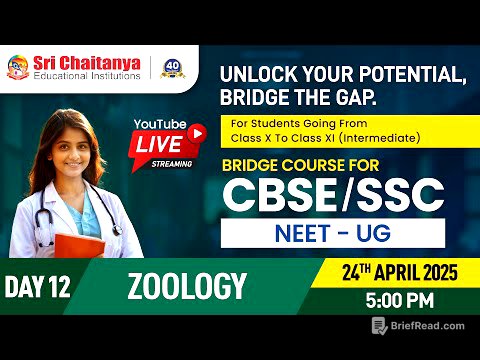TLDR;
This video features Dr. Dhawan, who shares his insights and strategies for NEET PG exam preparation, particularly for repeaters. He stresses the importance of mental health, smart study techniques, and efficient revision methods. He also shares his personal experiences and emphasizes the need to balance hard work with a happy and fulfilling life.
- Prioritize mental health and appreciate your MBBS seat.
- Adopt smarter study techniques, focusing on previous year questions and recent trends.
- Implement the 80/40/20 revision strategy for efficient content review.
- Balance theory with MCQ-based study (60/40 ratio).
- Divide challenging subjects into smaller parts and integrate breaks for better retention.
- Respect the MBBS degree and strive for a balanced life beyond exam preparation.
Diet and Breaks [0:00]
Dr. Dhawan advises against overeating, suggesting a light snack like tea, coffee, or a sandwich between 9 to 9:30 AM. He cautions against heavy carb intake, as it can lead to sluggishness. For lunch, he recommends a short rest by dozing off on a table and chair for 15-20 minutes instead of a full-fledged nap on the bed, which can leave one feeling groggy.
Social Media and Emotional Well-being [1:00]
During the dinner break (8 to 9:30 PM), Dr. Dhawan humorously mentions "KP RD" (खाना, पीना, रोना, धोना), advising against excessive emotional venting. He discourages social media use, especially platforms like Snapchat and Instagram, as they can fuel jealousy and distract from studies. He suggests temporarily deactivating such accounts to avoid unnecessary comparisons.
Importance of Mental Health and Appreciation [1:57]
Dr. Dhawan emphasizes the significance of mental health for doctors, noting that many residents feel unhappy despite securing good ranks and seats. He urges students to appreciate their MBBS seats, reminding them of the initial desperation to obtain them. He advises against letting exam stress erode one's personality.
Smart Study Techniques for NEET PG [3:31]
Dr. Dhawan suggests a smarter approach to studying for NEET PG, focusing on previous year questions, recent advances, and trends. He recommends dividing revisions into an 80/40/20 style, where 80% represents a quick scan, 40% involves reviewing important points, and 20% focuses on critical details. He stresses that the first reading is a preparation for future revisions.
Efficient Revision Strategies [6:03]
Every revision should take half the time of the previous one. For instance, if a subject took two days initially, the first revision should take one day, followed by 12 hours, and then six hours. The final look should focus on underlined main points. He cautions against passively reading without actively engaging with the material through MCQs.
Balancing Theory and MCQs [7:14]
Dr. Dhawan advises dedicating 40% of study time to MCQ-based learning. He emphasizes that not every word is important, and some pages can be quickly scanned. Reviewing key concepts and understanding their application through MCQs is crucial. He illustrates this with the example of Gradenigo's syndrome, where understanding the clinical presentation and investigations is more important than rote memorization.
Personal Experiences and Subject Preferences [9:19]
Dr. Dhawan shares his personal struggles with subjects like Microbiology, Pharmacology, and Biochemistry during MBBS. Despite disliking these subjects, he recognized their importance for securing a good rank in NEET PG. He advises students not to neglect subjects they dislike, as examiners often focus on them.
Breaking Down Challenging Subjects [13:18]
To tackle challenging subjects, Dr. Dhawan suggests breaking them into smaller, manageable parts. He advises against studying toxic subjects in sequence, as it can lead to discouragement. Instead, he recommends alternating between difficult and more enjoyable subjects to maintain motivation.
The Himachal Story: Prioritizing Studies [14:22]
Dr. Dhawan recounts an incident where his girlfriend (now wife) told him that he was a distraction to her studies. This prompted him to move to Himachal to focus on his preparation. He emphasizes that faculties were equally confused and faced similar challenges during their preparation days.
The Importance of This Phase [16:48]
Dr. Dhawan stresses that this is the second and probably the last time students will study in this manner. Residency involves more practical work than studying. He highlights that this year will decide the quality of life for the next 35 to 40 years. He advises students to choose a specialization they enjoy, as it's a lifelong commitment.
Dealing with Fear and Uncertainty [20:24]
Dr. Dhawan acknowledges that everyone experiences fear and uncertainty during exam preparation. He advises students to deal with fear by studying more and wasting less time. He encourages them to find motivation from within and avoid looking for external validation.
Summarizing Key Points [21:30]
Dr. Dhawan summarizes the key points, emphasizing the need to know rare disorders, understand conceptual orientations, and immerse oneself in study. He reiterates the importance of solving multiple-choice questions and maintaining a 60/40 balance between theory and MCQs.
Dr. Dhawan's Daily Routine During Preparation [22:30]
Dr. Dhawan shares his daily routine during his NEET PG preparation. He slept from 1 to 6 AM and followed a structured schedule:
- 7 to 9 AM: Biochemistry (Carbohydrates)
- 9 to 9:30 AM: Tea break with a light snack
- 9:30 to 11:30 AM: Continue Biochemistry (Carbohydrates)
- 11:30 AM to 12 PM: Tea break
- 12 to 2 PM: Continue Biochemistry (Carbohydrates)
- 2 to 3:30 PM: Lunch break and rest (dozing off on the table)
- 3:30 to 5:30 PM: Ophthalmology (Cataract, Lens)
- 5:30 to 6 PM: Tea break
- 6 to 8 PM: Continue Ophthalmology (Conjunctiva, Lens, Cataract)
- 8 to 9:30 PM: Dinner break and calls
- 9:30 PM to 1 AM: MCQs of Gynecology, followed by review of notes based on mistakes.
Social Media and Lifestyle Adjustments [26:10]
He advises against social media during preparation and suggests focusing on faculty posts with summaries and important points. He recommends doing 40 MCQs in 30 minutes, followed by reviewing notes based on mistakes.
The Importance of Output and Practicality [29:01]
Dr. Dhawan emphasizes the importance of the day's output and advises against unrealistic schedules. He suggests practical break times and a balanced approach to studying.
Relevance for FMG and the Exam Day Feeling [30:02]
Dr. Dhawan states that the same routine applies to FMG exams. He highlights the importance of feeling confident and prepared on the exam day, which comes from consistent hard work.
Deadlines and Revision Strategies [31:16]
For first-timers, Dr. Dhawan suggests dedicating 60 days (December and January) to reading and acquiring knowledge. In February and half of March (45 days), he recommends completing one more revision cycle. In the last part of March, he advises reviewing the content again.
Marking Notes for Efficient Revision [32:37]
Dr. Dhawan suggests marking notes with stars for important pages and brackets for specific points within a page. During revision, focus on these marked areas. He emphasizes that MCQ-based study should be a habit.
Interns and Time Management [34:59]
For interns, Dr. Dhawan advises choosing lighter postings if possible and completing toxic postings early. He suggests utilizing ward time for MCQs and focusing on focused reading in the library without distractions.
Clinical Questions and Integration [36:58]
Dr. Dhawan emphasizes the importance of integrating knowledge through MCQs, especially for clinical questions. He illustrates this with the example of Wegener's granulomatosis, where understanding the clinical presentation, histopathology, and relevant tests is crucial.
Grand Tests as Assessment Tools [40:03]
Dr. Dhawan advises using grand tests as assessment tools rather than evaluation tools. He suggests giving the grand test in a simulated manner and reviewing it thoroughly. He recommends writing down the top four weakest subjects after the GT and reviewing all questions.
Analyzing Grand Test Performance [41:27]
Dr. Dhawan suggests categorizing questions into three types:
- Questions known and solved correctly.
- Questions known but with silly mistakes.
- Questions not integrated properly.
He advises revising topics based on these categories. He also suggests noting down new information encountered in the GT.
Respecting MBBS and Staying Happy [44:57]
Dr. Dhawan concludes by urging students to respect their MBBS degree and develop a habit of staying happy. He advises against thinking that MD/MS is a license to be happy and encourages students to find happiness in the present.
Rapid Revision Strategies [46:10]
Dr. Dhawan advises against rapid revision notes and suggests real rapid revision, which involves reading the main notes at a faster speed. He reiterates the 80/40/20 strategy and advises against mobile phone usage during study. He suggests writing a summary of tough topics after solving MCQs.









